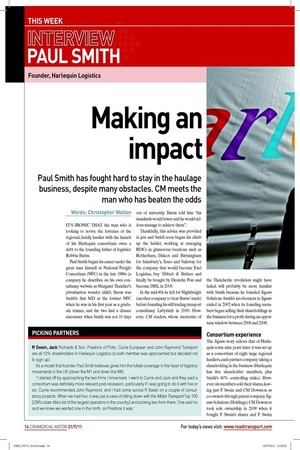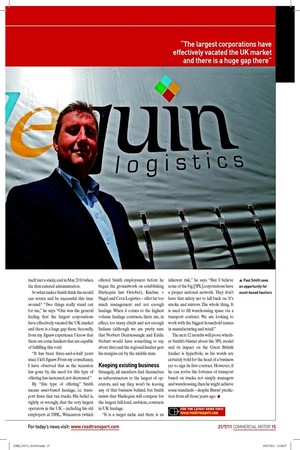Making an impact
Page 12

Page 13

If you've noticed an error in this article please click here to report it so we can fix it.
Paul Smith has fought hard to stay in the haulage business, despite many obstacles. CM meets the man who has beaten the odds
Words: Christopher Walton
IT’S IRONIC THAT the man who is looking to revive the fortunes of the regional, family haulier with the launch of his Harlequin consortium owes a debt to the founding father of logistics: Robbie Burns.
Paul Smith began his career under the great man himself at National Freight Consortium (NFC) in the late 1980s (a company he describes on his own consultancy website as Margaret Thatcher’s privatisation wonder child). Burns was Smith’s irst MD at the former NFC when he was in his irst year as a graduate trainee, and the two had a chance encounter when Smith was not 10 days out of university. Burns told him “his standards would lower and he would seldom manage to achieve them” .
Thankfully, this advice was provided in jest and Smith soon began his climb up the ladder, working at emerging RDCs in glamorous locations such as Rotherham, Didcot and Birmingham for Sainsbury’s, Tesco and Safeway for the company that would become Exel Logistics, buy Tibbett & Britten and inally be bought by Deutche Post and become DHL in 2005.
In the mid-90s he left for Nightfreight (another company to bear Burns’ mark) before founding his still trading transport consultancy Labyrinth in 2000. However, CM readers, whose memories of the Thatcherite revolution might have faded, will probably be more familiar with Smith because he founded Jigsaw Solutions. Smith’s involvement in Jigsaw ended in 2007, when its founding members began selling their shareholdings in the business for a proit during an opportune window between 2006 and 2008.
Consortium experience
The Jigsaw story echoes that of Harlequin some nine years later: it was set up as a consortium of eight large regional hauliers, each partner company taking a shareholding in the business (Harlequin has ive shareholder members, plus Smith’s 40% controlling stake). However, six members sold their shares, leaving just F Swain and CM Downton as co-owners through parent company Jigsaw Solutions (Holdings). CM Downton took sole ownership in 2009 when it bought F Swain’s shares and F Swain itself met a sticky end in May 2010 when the irm entered administration.
So what makes Smith think the model can return and be successful this time around? “Two things really stand out for me,” he says. “One was the general feeling that the largest corporations have effectively vacated the UK market and there is a huge gap there. Secondly, from my Jigsaw experience I know that there are some hauliers that are capable of fulilling this void.
“It has been three-and-a-half years since I left Jigsaw. From my consultancy, I have observed that as the recession has gone by, the need for this type of offering has increased, not decreased.” By “this type of offering” Smith means asset-based haulage, i.e. transport irms that run trucks. His belief is, rightly or wrongly, that the very largest operators in the UK – including his old employers at DHL, Wincanton (which offered Smith employment before he began the groundwork on establishing Harlequin last October), Kuehne + Nagel and Ceva Logistics – offer far too much management and not enough haulage. When it comes to the highest volume haulage contracts, there are, in effect, too many chiefs and not enough Indians (although we are pretty sure that Norbert Dentressangle and Eddie Stobart would have something to say about this) and the regional haulier gets his margins cut by the middle man.
Keeping existing business
Strangely, all members ind themselves as subcontractors to the largest of operators, and say they won’t be leaving any of that business behind, but Smith insists that Harlequin will compete for the largest full-load, ambient, contracts in UK haulage.
“It is a target niche and there is an inherent risk,” he says. “But I believe none of the big [3PL] corporations have a proper national network. They don’t have that safety net to fall back on. It’s smoke and mirrors. The whole thing. It is used to ill warehousing space via a transport contract. We are looking to work with the biggest household names in manufacturing and retail.”
The next 12 months will prove whether Smith’s bluster about the 3PL model and its impact on the Great British haulier is hyperbole, as his words are certainly bold for the head of a business yet to sign its irst contract. However, if he can revive the fortunes of transport based on trucks, not simply managers and warehousing, then he might achieve some standards – despite Burns’ prediction from all those years ago. ■














































